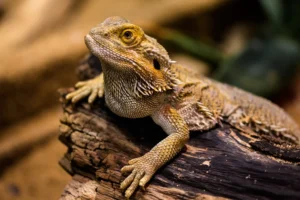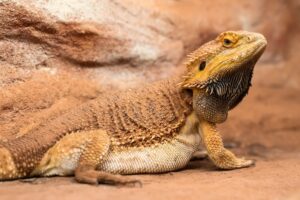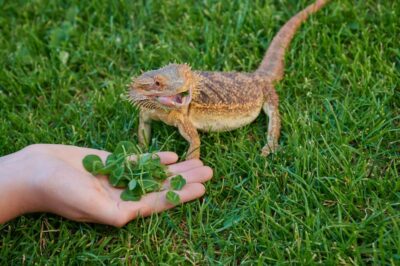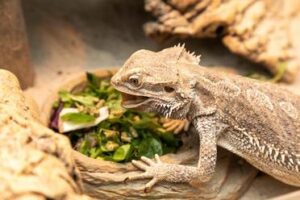Unlocking the secret to a healthy and vibrant bearded dragon begins with understanding their dietary needs. Among the crucial elements is a consistent and varied intake of vegetables. Delving into the realm of bearded dragon nutrition, we explore the question: What veggies can bearded dragons eat every day?
Bearded dragons can safely consume a variety of vegetables daily, including leafy greens like collard greens, mustard greens, and kale, alongside other options such as squash, bell peppers, and carrots.
When offering vegetables to your bearded dragon, it’s important to chop them into appropriately sized pieces to prevent choking and ensure easy digestion. Additionally, rotating the vegetables you offer can help provide a diverse range of nutrients and prevent boredom. Always remember to thoroughly wash vegetables to remove any pesticides or residues before feeding them to your pet.
Importance of a balanced diet for their health

Maintaining a balanced diet is crucial for the overall health and well-being of bearded dragons. Here are some key reasons why a balanced diet is important for their health:
- Nutritional Needs: Bearded dragons require a specific balance of nutrients to support their growth, development, and overall health. A diet that lacks essential nutrients can lead to deficiencies and health problems.
- Growth and Development: Young bearded dragons, in particular, require adequate protein, calcium, and vitamins for proper growth and development. A balanced diet ensures they receive the necessary nutrients to develop strong bones, muscles, and organs.
- Immune Function: A diet rich in vitamins, minerals, and antioxidants supports a healthy immune system, helping bearded dragons to resist infections and diseases.
- Digestive Health: Fibrous vegetables and leafy greens are essential for promoting digestive health in bearded dragons. These foods provide dietary fiber, which aids in proper digestion and helps prevent constipation and other digestive issues.
- Hydration: Vegetables with high water content, such as cucumbers and zucchini, contribute to hydration in bearded dragons. Maintaining adequate hydration is essential for overall health and proper bodily functions.
- Dental Health: Chewing on fibrous vegetables can help keep a bearded dragon’s teeth clean and healthy. Additionally, offering a variety of textures in their diet can help prevent dental issues such as overgrown teeth.
- Weight Management: A balanced diet helps regulate a bearded dragon’s weight, preventing obesity or malnourishment. Obesity can lead to various health problems, including fatty liver disease, while malnourishment can result in stunted growth and weakened immune function.
By providing a varied and balanced diet that includes a mix of vegetables, leafy greens, and occasional protein sources like insects, bearded dragon owners can ensure their pets receive the nutrients they need to thrive and lead healthy lives. Regular monitoring of their diet and health, along with veterinary care as needed, are essential components of responsible pet ownership.
Significance of vegetables in their diet
Vegetables play a crucial role in the diet of bearded dragons, providing essential nutrients, hydration, and dietary fiber. Here are some key reasons why vegetables are significant:
- Nutrient-Rich: Vegetables are packed with vitamins, minerals, and antioxidants that are essential for maintaining optimal health in bearded dragons. These nutrients support various bodily functions, including growth, immune function, and metabolism.
- Hydration: Many vegetables, such as cucumbers and leafy greens, have high water content, which helps keep bearded dragons hydrated. Adequate hydration is essential for proper digestion, kidney function, and overall health.
- Fiber: Fibrous vegetables, like squash and bell peppers, provide dietary fiber, which promotes healthy digestion and helps prevent constipation. Fiber also supports the growth of beneficial gut bacteria, contributing to overall digestive health.
- Calcium: Some vegetables, such as collard greens and kale, are excellent sources of calcium, an essential mineral for bone health and muscle function in bearded dragons. A diet rich in calcium helps prevent metabolic bone disease, a common health issue in reptiles.
- Vitamin A: Leafy green vegetables like mustard greens and dandelion greens are rich in vitamin A, which is important for maintaining healthy skin, vision, and immune function in bearded dragons.
- Variety: Offering a diverse range of vegetables ensures that bearded dragons receive a wide spectrum of nutrients, promoting overall health and well-being. Rotating vegetables in their diet also helps prevent dietary imbalances and boredom.
- Dental Health: Chewing on crunchy vegetables helps keep a bearded dragon’s teeth clean and healthy, reducing the risk of dental problems such as overgrown teeth or tooth decay.
- Weight Management: Vegetables are low in fat and calories, making them an ideal component of a balanced diet for weight management in bearded dragons. They provide essential nutrients without contributing to excessive weight gain.
Incorporating a variety of vegetables into a bearded dragon’s diet is essential for meeting their nutritional needs and promoting overall health. However, it’s important to research which vegetables are safe and appropriate for bearded dragons, as some may be toxic or difficult to digest.
So, offering a balanced diet that includes a mix of vegetables, leafy greens, and occasional protein sources like insects ensures that bearded dragons receive the nutrients they need to thrive.
Factors to consider when selecting vegetables



